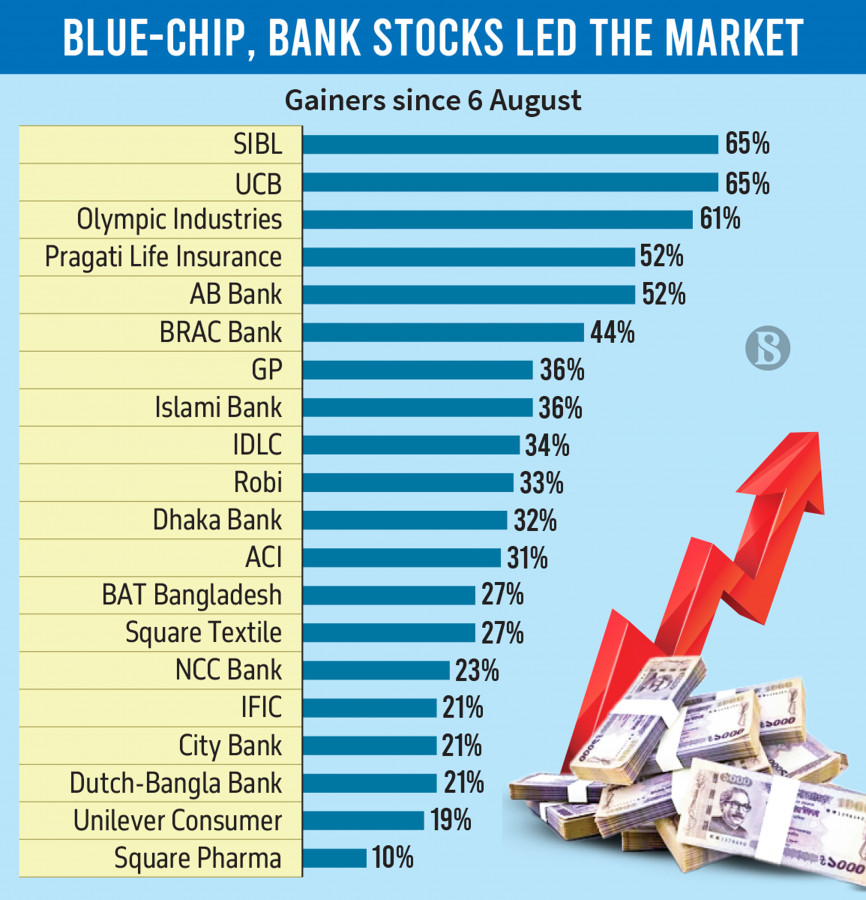Blue-chip and bank stocks are finally gaining momentum under the new administration, with investors increasingly channelling funds into these sectors, anticipating they will benefit from a more transparent business environment.
Following the fall of the Sheikh Hasina government, the benchmark index of the Dhaka Stock Exchange (DSE) saw a substantial rise of approximately 800 points between 6 and 11 August, driven primarily by strong blue-chip stocks and shares from the banking sector.
Blue-chip stocks continued their rally until today, despite profit-taking pressures from investors.
Shahidul Islam, chief executive officer of VIPB Asset Management, told The Business Standard, "The country had been practicing crony capitalism for a long time. As a result, a select group of businesses disproportionately benefited from the government. Essentially, the lack of rule of law put companies that operated in full compliance at a disadvantage. Consequently, shares of these companies – particularly multinationals and local firms committed to 100% compliance – were undervalued."
"The country is undergoing a reform process following the fall of the Awami League government, aiming to establish the rule of law and ensure a level playing field for all businesses. As a result, compliant blue-chip companies are expected to benefit. Investors are pouring funds into these shares, anticipating that these companies will no longer be undervalued," he said.
From 6 to 11 August, following Hasina's ouster, fundamentally sound companies such as Olympic Industries, Grameenphone, BAT Bangladesh, Square Textile, Square Pharmaceuticals, Robi, and Unilever Consumer Care experienced a sharp rise.
According to DSE data, shares of BAT Bangladesh – a multinational cigarette manufacturer – dropped to Tk300 for the first time in a decade following the removal of the controversial floor price, where its share price had been stuck for over two years.
Market insiders said despite the company's strong business performance in the country, it faced significant pressure from the National Board of Revenue (NBR) due to VAT and tax claims during the previous government, which led to a reputation crisis as a tax defaulter. After the regime change, its shares surged by 32%, reaching the Tk400 mark.
Similar to Grameenphone, the largest telecom operator, the previous government imposed several conditions on doing business. Additionally, it damaged Grameenphone's reputation by labelling it as a tax defaulter, with the case now pending in the High Court. These issues caused the company's share price to fall to its lowest level in a decade. However, its shares are now approaching the Tk300 mark after a long period, driven by hopes of a fair judgement under the new administration, according to market insiders.
Local companies that followed rules and regulations, such as Square Pharmaceuticals, Square Textile, Olympic Industries, and ACI, did not see their share prices rise in proportion to their business growth. However, their share prices are now increasing as investors believe these stocks were undervalued in previous years.
Bank stocks rally
In the last decade, the banking sector has experienced massive irregularities and corruption. With government assistance, banks have been taken over one after another, often disregarding rules and regulations. A few privileged groups have extensively looted the banks, leading to a significant weakening of the financial condition of most banks. Consequently, the amount of defaulted loans in the banking sector has surpassed one lakh crore taka. However, economists believe the actual amount of defaulted loans is much higher.
As a result, investors lost confidence in bank shares, with most banks' share prices falling below the face value of Tk10.
However, Shahidul Islam, CEO of VIPB Asset Management, believes that good governance will return to the banking sector due to the reform program initiated by the current government. He expressed hope that the looting and irregularities of the past would not be repeated. The Bangladesh Bank has already implemented several effective measures that are restoring investor confidence in the sector.
Banks that were taken over through a show of power have seen their share prices increase significantly following the fall of the government. The share price of Social Islami Bank, previously held by S Alam Group, rose by 65%, while Islami Bank's share price increased by 36%. The Bangladesh Bank has since removed the S Alam Group from the boards of these two banks. Shares of United Commercial Bank, owned by the family of former land minister Saifuzzaman Chowdhury, also rose by 65%.
A top official of a brokerage firm noted that trading in these banks' shares has increased since the government's fall, with transactions rising particularly around changes in bank ownership.
He also mentioned that those who took over the banks are holding shares in many banks anonymously and are now selling these shares. To become a director of a bank, one must hold at least 2% of the shares, so some groups are currently buying shares to meet this requirement.
Source: The Business Standard
